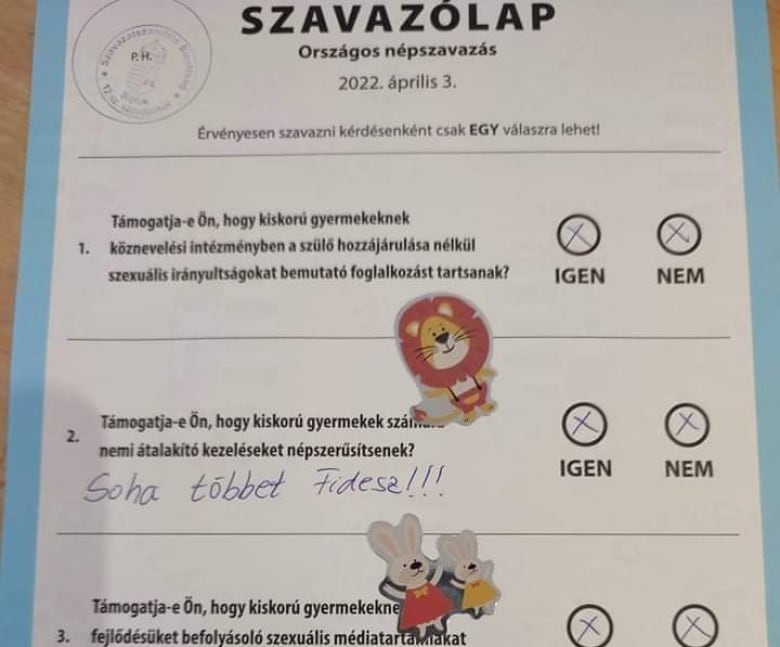After weeks of talk about a tight electoral race in Hungary's general election, voters delivered a two-thirds parliamentary majority to incumbent Viktor Orbán and his Fidesz party on Sunday.
But a separate referendum held on LGBTQ and transgender issues was declared invalid after a campaign by groups to spoil ballots.
Orbán's government said the referendum was a vote on child protection laws, but critics say the questions amounted to discrimination against the LGBTQ community and an attempt to whip up fear over what children are taught in school and exposed to in media.
"I find this stupid," Ágnes Kapornay told CBC at a polling station in the capital, Budapest, on Sunday, after she crossed out all of the questions on her referendum ballot.
"For a stupid question, I can't give a correct answer."

Of those who cast valid votes for the referendum, more than 90 per cent voted no to the following four questions:
- Do you support the teaching of sexual orientation to underage children in public education institutions without parental consent?
- Do you support the promotion of sex reassignment therapy for underage children?
- Do you support the unrestricted exposure of underage children to sexually explicit media content that may affect their development?
- Do you support the showing of sex-change media content to minors?
But in order for the referendum to be valid, more than 50 per cent of eligible voters had to mark a choice on all four questions. According to Hungary's National Election Office, fewer than 45 per cent of eligible voters cast valid ballots.
Around 20 per cent of the ballots were spoiled and social media was flooded with pictures of people who decided to make drawings, or otherwise wage a protest, instead of marking an X.
The referendum was largely symbolic and is seen as a response to the European Union, which launched legal action against Hungary last year over legislation that was passed in parliament.
It restricts anyone under the age of 18 from being shown pornographic content, or material that the government deems to be promoting homosexuality or transgender issues.
EU friction
The European Commission has labelled the law discriminatory, saying it goes against European values and it launched an infringement procedure, which could end with the EU's Court of Justice imposing financial penalties against Hungary.
Orbán, who told a Hungarian radio station last year that the EU was engaged in "legalized hooliganism," spoke about the law on the campaign trail, vowing that Fidesz would win the election and that the referendum on the law will stop the "gender madness sweeping across the Western world" from encroaching on Hungary.
At an election rally at Fidesz headquarters on Sunday, party supporter Josef Tatai told CBC that he voted with the government on this because he is a father of two daughters.
"Luckily in Hungary, [children's exposure to homosexuality and transgender messages] is not a big issue so far, but it has already started, so better to stop it at the beginning."
Referendum a 'farce'
Many in Budapest's LGBTQ community think that the wording of the questions in the referendum were so biased that it targets their community.
"It's still very disgusting that the government is trying to kind of stir up these transphobic, homophobic feelings among the public," said Evgeny Belyakov, 35, who spoke to CBC at a gay bar in Budapest on Saturday evening, before the vote.
WATCH | Hungary's LGBTQ community responds to referendum:

Belyakov, who moved to Budapest from Vladivostok, Russia, when he was in university, was not eligible to vote in Sunday's election, but encouraged all his Hungarian friends to spoil their ballots, as he saw the referendum as a farce.
He says on the whole, Budapest is a very accepting place, and he hopes Hungary doesn't follow Russia's example when it comes to the perception of the gay community.
"It's not just the law or the referendum, it's the whole ... climate of society, because it can snowball into more and more hatred and violence."
Belyakov spoke to CBC at Crush, a bar that holds evening drag shows. Among the performers is "Victoria Rose," whose day job is teaching math and chemistry.
"I find it really interesting that no one has a problem with children being taught about sexuality as long as it is heterosexuality," Rose told CBC.
"This party is just always looking for enemies. First, it was the immigrants... and now it's the gays."
The International Lesbian, Gay, Bisexual, Trans and Intersex Association called Sunday's referendum an attempt for the government to distract from "its gross failings and corruption" and instead use the LGTBQ community as a scapegoat.
Anti-immigration referendum
In 2016, Orbán's government held a referendum on immigration quotas during a refugee crisis in which thousands of migrants from countries including Syria and Afghanistan tried to make their way to Europe.

The vast majority of Hungarians who took part in that referendum voted against an EU quota system on how many migrants each country had to accept. But as with Sunday's vote, not enough people participated to make the referendum valid.
Despite the outcome of the immigration referendum, Orbán tried to paint it as a clear mandate to challenge the European Union over its migration policy.
With Orbán and Fidesz securing a clear majority in Sunday's vote — a victory that he described as so large that it could be seen from Brussels — critics fear the government will feel emboldened to pursue what Orbán has called Hungary's "illiberal democracy."
The country will likely remain at odds with the EU, which has suspended pandemic recovery fund payments to Hungary, along with Poland, for what it sees as the erosion of democratic issues related to judicial independence, media freedom and the rights of minorities, including the LGBTQ community.

















